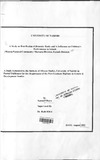| dc.contributor.author | Obara, Samuel | |
| dc.date.accessioned | 2013-06-28T13:56:53Z | |
| dc.date.available | 2013-06-28T13:56:53Z | |
| dc.date.issued | 2002 | |
| dc.identifier.citation | Post Graduate Diploma in Gender and Development Studies | en |
| dc.identifier.uri | http://erepository.uonbi.ac.ke:8080/xmlui/handle/123456789/41877 | |
| dc.description.abstract | The objective of this study was to establish the relationship between domestic chores
allocated to children and school performance vis-avis child well being.
The Study embraced quantitative and qualitative (including gender analysis tools)
research methods. The setting was Mashuru division - Kajiado district.
Results: 80% felt that domestic chores interferes with their academic work, 68% felt that
girls are allocated more duties than boys, 41% felt that boys naturally work harder than
girls.
Findings also indicate a high academic dropout rate by girls than boys especially in
classes five and six. This was associated to preference for early marriage of girls by the
community, sickness and lack of motivation/mentors. Seasons when classes are missed
most were during the dry season. Associated factors were fending for livestock and
seasonal migration in search of livestock pasture.
The study also identified disparities between subjects taught by male and female teachers
and has made a recommendation for further research.
In summary, this study has established that domestic chores affect children's academic
performance, child well being and future career choices. | en |
| dc.language.iso | en | en |
| dc.publisher | University of Nairobi | en |
| dc.title | A Study on Distribution of Domestic Tasks and Its Influence on Children's Performance in Schools (Maasai Pastoral Community Mashuru Division, Kajiado District) | en |
| dc.type | Thesis | en |
| local.publisher | Institute of African Studies University of Nairobi | en |

